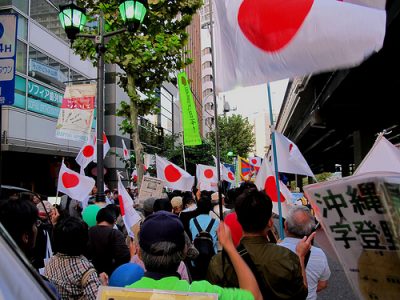The DPJ has been much more positive about the prospects of inclusive or cooperative leadership by Tokyo and Beijing in the regional project. This perception was symbolised under the Hatoyama administration through statements at the trilateral summit and by a large-scale official visit of parliamentarians to China.
But the DPJ was not blind to possibilities that a politically cooperative China might prove too difficult. For the DPJ, the East China Sea was seen as a good test case for a new cooperative era in Sino-Japanese relations. This attitude was visible in Hatoyama’s call for the creation of a ‘Sea of Fraternity’ to be created, including the establishment of a hot-line in 2009. At the same time, Foreign Minister Okada maintained Japan’s position toward East China Sea sovereignty during his dealing with China’s Foreign Minister Yang Jiechi – although their relationship was less than warm.
In the aftermath of the foreign policy crisis, the DPJ’s strategic perception of China, as seen in its rhetoric, has shifted from Japan and China ‘together’ in international society (and the US as a destabilising ‘foreign’ force) to one in which Japan and China are on opposite and opposing sides.
Increasingly, the rhetoric from influential figures such as Okada has been to identify that the fundamental difference between Japanese and Chinese society is the main obstacle to cooperation – specifically, the rule of law and existence of democratic institutions. The new Foreign Minister Maehara Seiji, who came into office in the midst of the crisis, has also singled out China’s attitude as ‘excessive’ – although a firm line from Maehara ought to come as no surprise as he already had links to the Coast Guard through his background as the former Transport Minister. Likewise, Defence Minister Kitazawa Toshimi expressed his concern that China was not willing to formally discuss the issues even in mid-October, and carefully pointed out that defensive links between the two countries are still weakening due to the crisis.
While careful not to get drawn into the fray for fear of criticism of his handling of the crisis, PM Kan Naoto has also waded in this debate by identifying fundamental differences between Japanese and Chinese society in last week’s Diet session. Although his statement was calling for the release of the Nobel Prize winner Liu Xiaobo rather than explicitly linked to the Senkaku islands issue, this link is being made by Japanese media given the PM’s ‘national interest’ phraseology. The strongest critic within the DPJ may well be Cabinet Secretary Sengoku Yoshito, who has linked the Senkaku dispute and the lack of shared values like free speech explicitly and is pushing for universal values to be discussed at the upcoming ASEAN+3 meeting (assuming that the leaders actually meet).
Indeed, many within the DPJ are concerned that their Party does not have sufficiently developed ‘pipes’ to influential members of the Chinese Communist Party. This is especially true with Ozawa Ichiro gone. Certainly there is a view among experts and the media that these informal links are weak. And DPJ party members such as Sengoku Yoshito have also supported that view.
Japan under the DPJ is returning to a position closer to that of the LDP. Despite Japan’s liberal proclivities, diffuse reciprocity as a principle to guide the Sino-Japanese relationship is out and a narrower form of specific reciprocity (or quid pro quo) is back in.
Joel Rathus is a recent PhD graduate from Adelaide University and a regular contributor to the East Asia Forum. His other posts can be found here.


How would Joel factor in the implications raised by the below development?
Japan leaders ‘broke secret islet pact with China’:
http://www.google.com/hostednews/afp/article/ALeqM5iv1w8-J_cnJunBb37hEbJUYo5lFA?docId=CNG.aec298041bd87d0d6ae2ef88e13bcbcd.311